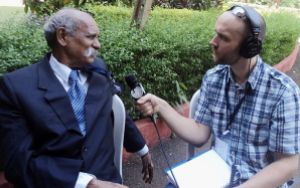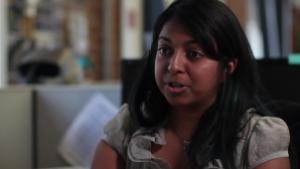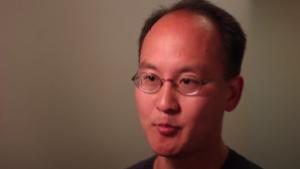When Victor Grigas first noticed Wikipedia, it was 2005 and it kept coming up in his search results. The only problem, he said, was that he hit too many dead ends. “Those were the red-link days, when English Wikipedia had a lot less content than it has now. At first I thought it was kind of annoying that my Google searches kept getting cluttered with this website that had bad information on it,” he said. “That kind of motivated me to press buttons and see what happens.”

Grigas was raised in Chicago and worked a number of jobs in construction and property management, before he switched paths completely and went to film school. On Wikipedia, he started editing articles related to Chicago and found that uploading pictures was a very effective way to make contributions. “I found myself taking photos of things that I thought might have some encyclopedic value even if it was on a bad 2G cell phone,” he said. “If I was passing by a monument and there was no photo of it on Wikipedia, I would say, I’ll take a shot. It’s better than nothing, and at any point somebody can come by and make it better.”
Grigas carried this spirit of iterative collaborations to other topics, including articles on graffiti, one of his passions and a form of communication he compares with editing. “Wikipedia in a lot of ways is an encyclopedia by graffiti: the good stuff stays up, and the bad stuff gets erased,” he said. “And even sometimes the good stuff gets erased too, but then the beauty of Wikipedia is, you can always come and replace it again; it’s two clicks away.”
Storyteller
As part of the 2011 Wikimedia fundraiser, the Wikimedia Foundation created three positions for Storytellers and Grigas was hired for the team (full disclosure: I was also one of the Storytellers in 2011). The Storyteller role combined interviewing with fundraising, copywriting and photography in an effort to diversify and improve the content of the banners and landing pages that make up the annual drive for donations. Grigas said the position fit with everything he cared about.
“I have my job acceptance PDF framed in my house — it was just the most triumphant thing in the world,” he said. “It involves all the things I believe in, to my core. It embodies transparency, education, I mean, my mother is a schoolteacher, my father found his way out of the gutter with education.”
As a Storyteller, Grigas combined his expertise in audio and video production with a fair bit of improvisation, given that this was uncharted territory for the Foundation. He interviewed as many Wikipedia editors, contributors and readers as possible to chronicle the community that makes Wikipedia flourish. In the beginning, Grigas said the process was a bit “chaotic” and involved a lot of trial and error. “We just asked a bunch of questions, but didn’t quite know [what would work],” he said. “Sometimes you go into an interview kind of blind. Sometimes I’ll meet somebody with a reference and I don’t have very much background information.”
Grigas said that one particular documentary project he worked on, “I am Chicago,” prepared him for the challenge. The project was a photo documentary where he and the team retrofitted a moving truck as a portrait studio, parked it at intersections around the city, and tried to get passersby to participate in the project. “We’d roll out a red carpet and hang out on the intersection all day trying to get people to sign a consent waiver and come into the truck to get a full body portrait,” he said. “You have to go into it with a sense of adventure, Chicago can be a wild place sometimes. You learn a lot about people and how to convince them to come in to be recorded.”
Over time, Grigas honed the Wikimedia interview process, spending a great deal of time exploring the personal stories of his interview subjects. He realized that his film background was very useful for the process and compared the public interest in the Wikipedia editors who appeared in the 2011 fundraiser to the feeling of watching a movie. “[You] get to meet somebody in a sort of odd fundraising way. You get to look at somebody and find out where they’re from and get why this means something,” he said.
Grigas is now the full-time Storyteller for the Foundation, as well as its resident video expert, and he is constantly reaching out to Wikipedians around the world. He conducts Storyteller interviews over the phone, on Skype, chat, or by email, but he said the most effective interviews are in person. As a result, he has traveled to numerous countries, including Israel for Wikimania 2011, India, Brazil, Argentina, Germany and Russia. In total, he has conducted almost 200 interviews.
The rewards go far beyond the success of a funding campaign and Grigas said he appreciates the personal connections he makes with people who are dedicated to improving Wikipedia. “It’s easy to think of it as this thing from the Internet, not people. But that’s really what it is, it’s people,” said Grigas. “It’s really great when I get to talk to somebody who doesn’t quite realize how their efforts, their silent efforts, are affecting other people. To kind of see that in somebody else, that’s rewarding for me.”
Wikimania 2012
For the 2012 Wikimedia fundraiser, Grigas is leading a team of videographers at Wikimania 2012 in Washington, DC, USA, as they conduct more than 100 interviews, many of them on video.
“The hard part about my job is finding people,” he said. “I’m hoping that people will read this — if they’re involved in the movement and think they have a good story to tell, try to contact me. Or if they know somebody who’s got an interesting story about Wikipedia and how they’ve interacted with Wikipedia, to try to contact me.”
Will he make them famous through the fundraiser?
“The victims of left alignment!” he joked, referring to the meme that developed around the 2011 Fundraiser. Grigas said he doesn’t ultimately decide who runs in the banners, but he said that taking part in the Storyteller interviews benefits Wikipedia.
“One of the things I tell people is: ‘If you talk with me, you’re going to help make Wikipedia better. You’re going to help the movement.'”
(To participate in an interview at Wikimania 2012, reach out to Victor directly through his user page. Watch two of Victor’s videos below.)
Matthew Roth, Global Communications Manager



Can you help us translate this article?
In order for this article to reach as many people as possible we would like your help. Can you translate this article to get the message out?
Start translation